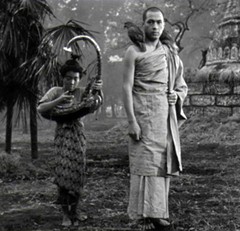 It took us well over a week, but we finally got around to finishing Harp of Burma last night, while sitting on the 2 train back from Brooklyn. Yes, a week-plus is an awful long time to tackle a so-called children’s book, one which clocks in at a measly 132 pages. But such is life these days, with so many projects weighing us down and Microkhan Jr. causing plenty of mischief.
It took us well over a week, but we finally got around to finishing Harp of Burma last night, while sitting on the 2 train back from Brooklyn. Yes, a week-plus is an awful long time to tackle a so-called children’s book, one which clocks in at a measly 132 pages. But such is life these days, with so many projects weighing us down and Microkhan Jr. causing plenty of mischief.
We’re glad we stuck with the book, though, because it’s a minor gem—an elegant anti-war fable, imbued with stinging criticism of Imperial Japan’s appetite for conquest. The tale doesn’t really gel until the final 30 pages or so, when the fate of the only named character—soldier-turned-monk Mizushima Yazuhiko—is revealed through a letter. There are plenty of great passages in this section, but the one that struck us most concerns Mizushima’s efforts to coax a battalion of cornered Japanese soldiers to surrender to the British. This seems like a no-brainer, given that a) the Japanese are malnourished, surrounded, and vastly outnumbered, and b) the war has been over for days. But the soldiers, hiding in a Burmese cave and drunk on sake, insist on dying rather than surrendering. And in this refusal, Mizushima makes an eloquent observation about mob psychology—and, perhaps, about the Japanese psyche:
As I listened I felt these raging men were controlled by a strange force. Perhaps they were thinking different thoughts, but as a group their individuality had faded away. Having incited one another with a false show of courage, they could no longer back down. They could no longer take a different attitude. Something other than the will of the individual was making decisions and manipulating the group. I was at a loss as to how to come to grips with this stubborn thing. No doubt some of the men were determined to fight to the death—yet there also seemed to be those who doubted if that was the right course of action. But they could not speak out. Besides being too weak to resist the crowd, they were ignorant of the actual situation. They had no way to judge it. Even if they wanted to assert their opinion, they had nothing solid to build on. That is why the spirited but reckless argument had won the day…
On the downside, Harp of Burma contains an anthropologically incorrect depiction of Burmese cannibals—they are said to enjoy the taste of dumplings soaked in human sweat, but we can find no independent source to verify this practice as anything more than a figment of the author’s imagination.
(Image from the 1956 film version of the book, via Cinema Strikes Back)


eraserhead // Jul 7, 2009 at 12:46 pm
And thank *you*, sir, for leading me to this book, which I read yesterday. (Unlike you, I have fewer distractions, and Jr. is 22.) A minor gem, indeed, and not at all what I was expecting from your previous post. I was expecting a Japanese “With the Old Breed” and got this strange, almost wistful, Buddhist tract. Most enjoyable.
Brendan I. Koerner // Jul 7, 2009 at 1:21 pm
@eraserhead: Glad to hear I steered you right on “Harp of Burma.” I can’t remember the last time a “children’s book” stuck with me like this.
I was similarly surprised by the plot. The way it was talked up to me, I thought it would be a chronicle of combat. But no–the fighting ends within the first ten pages. Things didn’t quite gel for me, though, until the monk’s letter, esp. the final meditation on the virtues of Burma versus those of Japan.
Very critical of Japan losing touch with its spiritual roots. At the same time, quite admiring of the West–the monk is obv. touched by the reverence the British show for their dead.